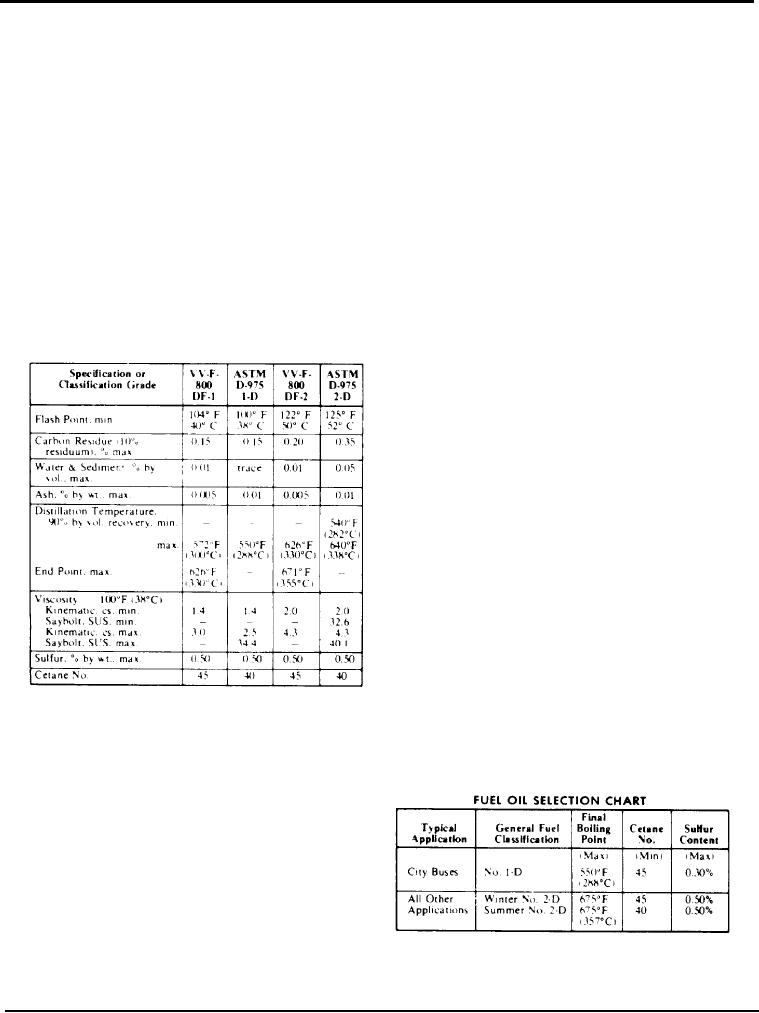
DETROIT DIESEL FUEL OIL SPECIFICATIONS
presence of these contaminants from storage instability
GENERAL CONSIDERATIONS
must be resolved with the fuel supplier.
The quality of fuel oil used for high-speed diesel engine
DETROIT DIESEL FUEL OIL SPECIFICATIONS
operation is a very Important factor in obtaining
satisfactory engine performance, long engine life. and
Detroit Diesel Allison designs. develops. and man-
acceptable exhaust.
ufactures commercial diesel engines to operate on die-
sel fuels classified by the ASTM as Designation
Fuel selected should be completed distilled material.
D-975 (grades 1-D and 2-D). These grades are very sim-
That is the fuel should show at least 98 percent by
ilar to grades DF-1 and DF-2 of Federal Specification
volume recovery when subjectcd to ASTM D-86 dis-
VV-F-800. Residual fuels and furnace oils, generally,
are not considered satisfactory for Detroit Diesel
tillation. Fuels marketed to meet Federal Specification
engines. In some regions. however, fuel suppliers may
VV-F-800 (grades DF-1 and DF-2) and ASTM Designa-
distribute one fuel that is marketed as either diesel fuel
tion D-975 (grades 1-D and 2-D) meet the completely
( A S T M D-975) or domestic heating fuel (ASTM
distilled criteria. Some of the general properties of
D-396) sometimes identified as furnace oil. In this case.
VV-F-800 and ASTM D-975 furls are shown below.
the fuel should be investigated to determine whether
the properties conform with those shown in the "FUEL
OIL SELECTION CHART" presented in this
FEDERAL SPECIFICATION S ASTM
specification.
DIESEL FUEL PROPERTIES
The "FUEL OIL SELECTION CHART" also will serve
as a guide in the selection of the proper fuel for various
applications. The fuels used must be clean, completely
distilled, stable. and non-corrosive. DISTILLATION
RANGE, CETANE NUMBER. and SULFUR CON-
TENT are three of the most important properties of
diesel fuels that must he controlled to insure optimum
combustion and minimum wear. Engine speed, load,
and ambient temperature influence the selection of
fuels with respect to distillation range and cetane
number. The sulfur content of the fuel must be as low
as possible to avoid excessive deposit formation, pre-
mature wear. and to minimize the sulfur dioxide ex-
hausted into the atmosphere.
To assure that the fuel you use meets the required
properties. enlist the aid of a reputable fuel oil supplier.
The responsibility for clean fuel lies with the fuel
supplier as well as the operator.
During cold weather engine operation. the cloud point
(the temperature at which wax crystals begin to form
in diesel fuel) should be 10F (6C) below the lowest
expected fuel temperature to prevent clogging of the
fuel filters by wax crystals.
Residual fuels and domestic furnace oils are not con-
At temperatures below -20F (-29C). consult
sidered satisfactory for Detroit Diesel engines; how-
an authorized Detroit Diesel Allison service outlet,
e v e r . some may be acceptable. (See "DETROIT
since particular attention must be given to the cooling
DIESEL FUEL OIL SPECIFICATIONS.")
system, lubricating system, fuel system. electrical sys-
tem. and cold weather starting aids for efficient en-
NOTE: Detroit Diesel Allison does not recommend
gine starting and operation.
the use of drained lubricating oil as a diesel fuel oil.
Furthermore, Detroit Diesel will not be responsible
for any engine detrimental effects which it deter-
mines resulted from this practice.
All diesel fuel oil contains a certain amount of sulfur.
Too high a sulfur content results in excessive cylinder
wear due to acid build-up in the lubricating oil. For
most satisfactor) engine life. fuels containing less
than 0.5% sulfur should be used.
Fuel oil should be clean and free of contamination.
NOTE: When prolonged idling periods or cold
Storage tanks should be inspected regularly for dirt,
weather conditions below 32F (0C) are en-
water or water-emulsion sludge. and cleaned if con-
countered. the use of lighter distillate fuels may be
taminated. Storage instability of the fuel can lead to
more practical. The same consideration must be
the formation of varnish or sludge in the tank. The
made when operating at altitudes above 5,000 ft.
Page 76

